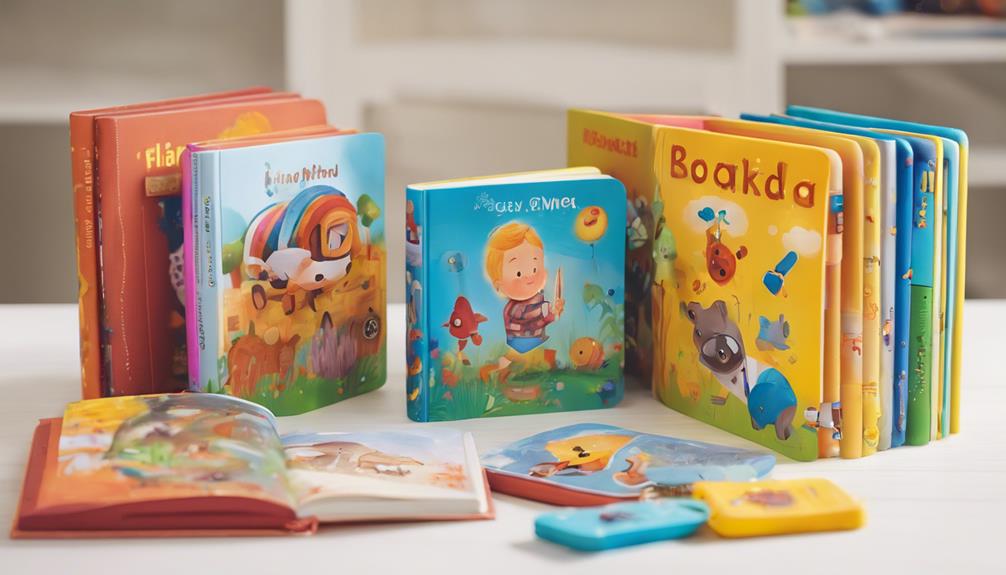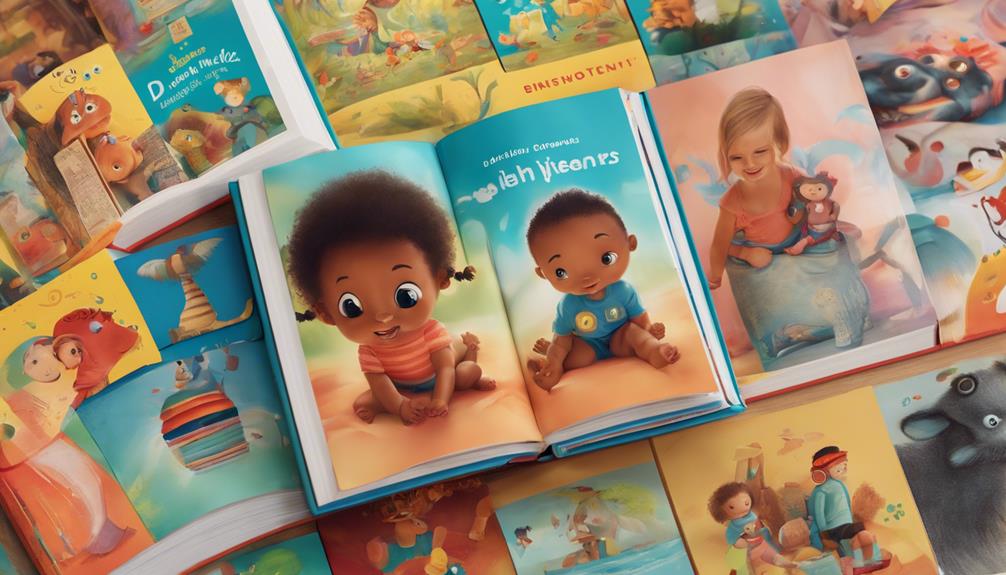For optimal baby brain development, prioritize high-contrast, engaging, interactive, and rhythmic pattern books. High-contrast books with bold black and white colors help stimulate newborns’ senses. Engage infants with board books featuring simple pictures and tactile elements to foster cognitive growth. Interactive books promote sensory exploration and fine motor skills development, supporting early learning. Rhythmic pattern books aid in language skills and cognitive development through rhyme. Selecting age-appropriate books tailored to your child’s development stage maximizes their learning potential. Finding the best books for stimulating baby brains is crucial for nurturing cognitive growth and sensory development in young ones.
Key Takeaways
- High contrast books aid in optic nerve growth and cognitive development for newborns.
- Tactile books promote sensory development through touch and interaction for infants.
- Rhyming books create a nurturing environment for cognitive growth in babies.
- Interactive books enhance cognitive skills and early reading engagement.
- Choosing age-appropriate books with engaging elements stimulates brain activity in babies.
High-Contrast Books for Newborns
To support your newborn's visual development, introduce high-contrast books early on. These books, with their bold black and white colors, stimulate your baby's senses and help their optic nerves grow. Research indicates that these contrasting colors register strongly in a baby's brain, aiding in cognitive development. Wordless picture books with vivid colors can captivate your child's interest and provide essential visual stimulation. By reading high-contrast books to your baby, you're actively contributing to their visual development during the critical early stages of life.
Parents play an important role in selecting the right board books for their children, especially in the field of early childhood development. Bold black and white shapes create engaging patterns that can enhance your baby's cognitive abilities. Incorporating high-contrast books into your child's reading routine can have a positive impact on their visual and cognitive development.
Engaging Board Books for Infants

Engage your infant with board books featuring simple pictures and interactive textures that captivate their senses and promote early cognitive stimulation.
Opt for high-contrast board books to provide visually stimulating experiences that aid in your baby's cognitive development.
Choosing durable board books with rhythmic patterns or rhymes can enhance language development and auditory skills during reading sessions with your little one.
Interactive Sensory Experiences
For infants, interactive sensory experiences through engaging board books play a crucial role in stimulating early cognitive development. Tactile board books provide babies with hands-on exploration, allowing them to touch and feel different textures, enhancing their sensory development.
Newborns' visual senses benefit greatly from high-contrast board books, featuring bold black and white patterns that captivate their attention and support visual stimulation.
Choosing age-appropriate board books is essential for fostering engaging sensory experiences that promote cognitive development and language skills in infants. Interactive board books with flaps or textures offer interactive elements that encourage exploration and learning in young children.
Rhyming board books, designed for babies aged 6-12 months, not only enhance cognitive development but also help in language skill development through rhythmic patterns and engaging storytelling.
Early Cognitive Stimulation
Selecting the appropriate board books tailored to your infant's age is vital for promoting early cognitive stimulation and fostering their development.
High-contrast board books with bold colors and patterns are ideal for infants, stimulating their developing senses.
Tactile board books, featuring different textures and shapes, encourage interaction and sensory stimulation, aiding in brain development.
Rhyming board books not only support language development but also enhance cognitive skills and memory retention in infants.
Interactive board books, with flaps or textures, keep infants engaged and curious, providing a valuable learning experience.
It's important to choose age-appropriate board books to make sure that infants remain interested and engaged in the reading process, supporting their early cognitive stimulation.
Interactive Books for Sensory Exploration
Amidst the array of options for promoting sensory development in babies, interactive books provide a stimulating avenue for exploration and learning. These books are designed to engage infants through various sensory elements like textures, flaps, and sounds, encouraging tactile stimulation and fine motor skills development.
By interacting with these books, babies not only enhance their sensory exploration but also support cognitive development and sensory integration.
One significant benefit of interactive books is that they introduce cause and effect relationships to babies at an early age. As infants touch, feel, and explore the different components of these books, they learn how their actions can lead to specific outcomes, fostering a deeper understanding of the world around them.
Additionally, engaging with interactive books sparks curiosity in babies, nurturing their exploration skills and laying a strong foundation for future learning experiences.
Rhythmic Pattern Books for Language Development

Rhythmic pattern books are essential for your baby's language development. They provide a fun way to learn vowel and consonant sounds, boosting cognitive skills.
Introducing rhyme time early on can foster a love for reading and storytelling in your little one.
Importance of Rhythm
Engaging with rhythmic pattern books is essential for fostering language development in babies. The rhythm and rhyme in these books help infants learn vowel and consonant sounds, aiding in their cognitive growth and memorization skills.
Introducing rhyme time early on can instill a lifelong love of reading in little ones. Reading such books for just 20 minutes a day not only boosts language skills but also contributes markedly to their social and emotional development.
The rhythmic patterns create a nurturing environment for babies to engage with language and storytelling, enhancing their overall language development. By exposing babies to these rhythmic books, caregivers are providing them with a rich linguistic experience that sets a strong foundation for future literacy.
Cognitive Benefits Explained
Introducing rhythmic pattern books to babies can greatly enhance their language development and cognitive skills. Rhyming pattern books aid in language development by helping babies learn vowel and consonant sounds, while cognitive benefits include enhancing memorization and cognitive skills in infants.
Reading with a child for 20 minutes daily with rhythmic pattern books supports social and emotional development, creating a nurturing environment for babies and fostering early language skills and cognitive growth.
When you engage your little one with rhythmic pattern books, you're not just reading; you're laying the foundation for their future success. These books offer a gateway to a world where language skills flourish, and cognitive abilities sharpen, all within the cozy embrace of a shared storytime.
Best Rhythmic Pattern Books
Enhance your baby's language development with these top picks for rhythmic pattern books that stimulate early cognitive growth and memory retention.
Every day, reading rhythmic pattern books can have a profound effect on a baby's brain, helping them learn vowel and consonant sounds through repetition. These books not only aid in cognitive development but also create a nurturing environment for little ones, enhancing their language skills.
Introducing rhyme time with rhythmic pattern books can instill a love for reading early on, impacting a child's view of the world around them. Baby Books that Boost language development are essential for every Childs' bookshelf.
Reading these books for 20 minutes every day can support social and emotional development in infants, laying a strong foundation for their future learning. Remember, with rhythmic pattern books, every word read counts towards your baby's growth and development.
Age-Appropriate Developmental Books

For parents seeking age-appropriate developmental books for their children, it's important to take into account the specific cognitive and sensory needs of each stage of early childhood.
When selecting books for your little one, consider the following:
- High-contrast books: These stimulate newborns' senses with black and white colors, which register strongly in a baby's brain, aiding in early sensory stimulation.
- Tactile books: Encourage interaction and sensory development in infants through touch, shaking, and grabbing, fostering both cognitive and motor skills.
- Rhyming books: Create a nurturing environment for babies aged 6 to 12 months, aiding in cognitive development and language acquisition.
Categorizing books based on your child's age will allow you to tailor choices to their developmental stages, nurturing their early literacy skills effectively.
Additionally, introducing age-appropriate themes and topics in books can match your child's interests and abilities, maximizing engagement and learning opportunities.
Cognitive Growth Through Reading

Reading plays an important role in fostering cognitive growth in infants and young children. When caregivers read to babies, they help them connect images with words, which is essential for child brain development.
Exposure to language through reading is key to closing the word gap and promoting cognitive growth. Research shows that babies vocalize less with electronic toys than with books, underscoring the importance of reading for cognitive development.
Engaging in dialogic reading, where caregivers involve babies in conversation while reading, enhances cognitive growth significantly. Additionally, reading high-contrast books can stimulate newborns' senses and aid in the growth of optic nerves, further promoting cognitive development.
Early Literacy Skills Enhancement

To further support cognitive growth in infants and young children, exploring early literacy skills enhancement is essential. Incorporating activities that focus on reading and language development from an early age can have a profound impact on your child's cognitive abilities.
Here are three ways to boost your child's early literacy skills:
- Choose books for babies: Selecting age-appropriate books with engaging illustrations and interactive elements can help stimulate brain activity and foster a love for reading.
- Enhance emotional skills that contribute: Reading books that explore emotions and social interactions can aid in developing empathy and understanding in your child.
- Understand the developing brain: Learning about the neuroscience of early childhood can provide valuable insights into how to tailor reading experiences to maximize your child's learning potential.
Best Books for Baby Brain Stimulation

Choose high contrast books when seeking the best brain stimulation for your baby's early development. High contrast books are essential for child brain development, as they use black and white colors that newborns' brains register strongly. These books aid in newborn optic nerve growth, supporting their visual development.
Additionally, tactile books offer interactive experiences, promoting infant sensory development through touch. Rhyming books play an important role in cognitive development by creating a nurturing environment for babies and helping with memorization.
When selecting books for baby brain stimulation, consider age-appropriate options to make sure effective engagement. Interactive books are also beneficial for enhancing cognitive skills and fostering a love for reading from an early age.
Frequently Asked Questions
What Is Best for Baby Brain Development?
To support your baby's brain development, interact with high-contrast and tactile books for sensory stimulation. Rhyming books aid cognitive growth. Tailor book choices to your child's age for best brain development. Early exposure fosters a love of reading.
How Do I Teach My Baby to Develop Brain?
To teach your baby to develop their brain, engage in interactive activities like reading high-contrast and tactile books. Create a nurturing environment that encourages sensory exploration, rhyming, and age-appropriate content to support their cognitive growth effectively.
Which Books to Read During Pregnancy for Baby Brain Development?
During pregnancy, read rhythmic, soothing books to bond with your baby. Stimulate their developing brain by reading uplifting, positive stories. Research shows babies recognize familiar tales after birth, highlighting the impact of prenatal reading on early brain development.
At What Age Is a Baby's Brain Fully Developed?
By age 3, a baby's brain is about 80% developed, with important neural connections forming through experiences and interactions. Adequate stimulation, nurturing environments, and positive interactions are essential for excellent brain development in babies.
Conclusion
Just like a well-loved book can stimulate a baby's brain development, a foot massager can provide soothing relief and relaxation for tired feet. Both offer a form of sensory stimulation that promotes overall well-being.
So whether you're reading to your little one or giving yourself a foot massage, remember the power of sensory experiences in nurturing both body and mind.
Choose wisely, and enjoy the benefits of these simple yet impactful tools for growth and relaxation.










